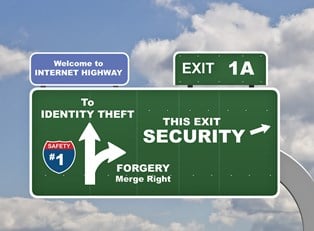Traveling abroad can be a very exciting experience, but there are many criminals who will take advantage of the fact that we’re in a foreign location. It can be difficult to protect your identity while abroad, but here are 10 tips that will help your identity stay safe.
1. Purchase a money belt.
Money belts can be a life-saving accessory that keeps your confidential information close to you at all times. You wear these belts inside of your clothing where criminals cannot easily reach. When you’re not at your hotel, keep all essential documents in your money belt and away from sticky fingers.
2. Try to avoid public computers.
Public computers may seem like a haven, but use them with caution. Never look up your bank accounts or other valuable information on these networks. You never know who has used the device and what sort of malware can steal your account numbers and more.
3. Be wary of internet connections.
Browsing on your phone may seem safe, especially when the wi-fi connection says “secure.” Unfortunately, not every internet connection is secure as it seems. Only use secure connections and be selective when you access your secure information.
4. Leave unnecessary documents at the hotel.
Most hotels while traveling are equipped with a safe where you can store valuables while you’re moving about the city. You should always keep your passport with you (safely inside your money belt), but consider leaving documents like plane tickets or bank statements in the safe at the hotel.
5. Use a dedicated travel email address.
Believe it or not, someone can do damage to your identity using just your email address. There may be times you need to access work while abroad, but during these situations, you should create a unique email you’ll use only while in another country.
6. Check your credit card statements often.
The first signal that your accounts have been compromised is fraudulent charges. When possible, check your credit card statements to ensure that everything is verified. Only do this when you’re sure your connection is secure. Inspect each charge for suspicious activity and contact your bank if you spot something strange.
7. Only use bank ATMs.
Credit card skimmers or readers can happen anywhere, but bank ATMs are much more secure than independent ones that are located outside on the street.
8. Secure your phone and computer.
A lot of information can be pulled from your phone and computer, so securing these devices should be a top priority. Make sure that the equipment has a complicated password and the hint doesn’t make the answer obvious. While a phone can have a PIN, you can also download an app that password locks individual applications on your phone as well.
9. Check your credit report after you return home.
Many people fail to check their credit report when they return home from traveling abroad. This report is the best way to determine if something has happened to your identity while you were abroad.
10. Change passwords and PINs regularly.
While changing your passwords and PINs may seem like a hassle, it’s an excellent way to save yourself from identity theft. Some criminals wait patiently until you’ve returned home to attack your credit, as it can be harder to repair the issue.


